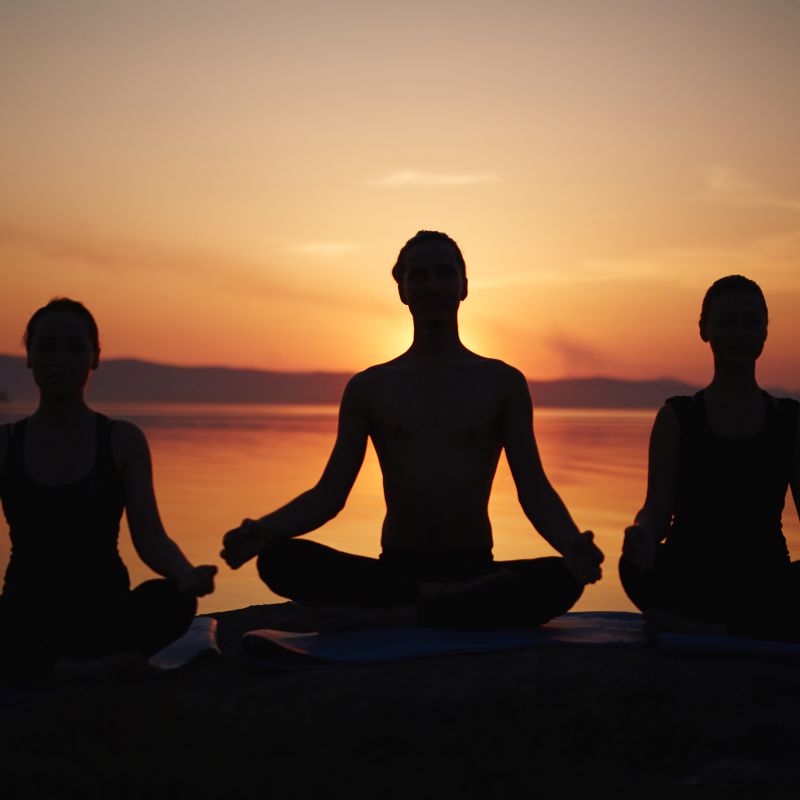Yoga Teacher Training India
Train where yoga was born. Breathe deep, live fuller, and share the timeless art of yoga with the world.
Discover the roots of yoga where it was born.
India is home to the most authentic and immersive Yoga Teacher Training experiences in the world. Here, learning yoga goes beyond postures, it’s a journey through philosophy, discipline, and self-awareness. From the tranquil Himalayas to the peaceful beaches of Goa, every place carries its own rhythm of practice and transformation.

What Yoga Teacher Training Includes
A typical TTC in India blends traditional teachings with modern understanding, offering a holistic learning experience that nurtures both the practitioner and the teacher within.
Common areas of study include:
- Asana practice, alignment, and sequencing
- Pranayama and meditation techniques
- Yoga philosophy and lifestyle
- Anatomy and physiology for yoga
- Teaching methodology and practicum
Why Yoga Teacher Training (TTC) in India
India is not just where Yoga was born. It’s where Yoga is still lived, practiced, and passed down through unbroken lineages. This makes it the most powerful place to pursue a Yoga Teacher Training Course (TTC). Advantages of Yoga Teachers Training from India includes
- Authenticity & Lineage: Learn directly from masters in traditional schools like Sivananda, Ashtanga (Mysore), Bihar School, and more.
- Immersive Environment: Live in ashrams where Yoga is not just a subject, but a way of life complete with meditation, sattvic diet, pranayama, and Karma Yoga.
- Affordability: World-class TTCs at a fraction of the international cost.
- Cultural and Spiritual Context: Practice in spiritually charged settings, the Ganges in Rishikesh, the temples of Varanasi, or the forests of Kerala.

Types of Yoga Teacher Training Courses (TTCs)
If you’re considering becoming a certified Yoga teacher in India, it’s important to understand the various types of Yoga Teacher Training Courses (TTCs). These courses differ by level, duration, style, and certification, including both international (Yoga Alliance) and Indian government-recognized standards (IYA/YCB).
Here’s a clear breakdown to help you choose the right path:
200-Hour Yoga Teacher Training (Beginner Level)
- What it is: The most popular foundational Yoga TTC worldwide. This course equips you with the essential knowledge and practice to begin teaching Yoga professionally.
- Who it’s for: Beginners or intermediate practitioners looking to teach, build confidence, or deepen their practice.
- What you learn:
- Classical asanas and sequencing
- Yogic philosophy and ethics
- Anatomy and physiology
- Pranayama and meditation techniques
- Teaching methodology and adjustments
- Formats: 3–4 weeks full-time residential / modular online
- Certifications: Yoga Alliance RYT-200 | IYA Level 1 (Yoga Protocol Instructor) or YCB Level 1 (Govt. of India)
300-Hour Yoga Teacher Training (Advanced Level)
- What it is: An advanced program designed to build upon your 200-hour foundation. It provides deeper immersion into the subtle aspects of Yoga teaching.
- Who it’s for: Certified 200-hour graduates (RYT-200 or IYA Level 1) looking to elevate their skills, specialize, or pursue mentorship.
- What you learn:
- Advanced asana alignment and assists
- Yoga therapy and Ayurveda
- Philosophy (Bhagavad Gita, Hatha Yoga Pradipika, Upanishads)
- Advanced teaching methods, sequencing, and practicum
- Formats: 4 – 6 weeks or split into modules
- Certifications: Yoga Alliance RYT-300 (can be combined with 200 for RYT-500) | IYA Level 2 (Yoga Wellness Instructor) or YCB Level 2
500-Hour Yoga Teacher Training (Combined or Master-Level)
- What it is: An intensive, Yoga Teacher Training that blends both beginner and advanced modules into a single, transformative experience.
- Who it’s for: Designed for aspirants pursuing a career in yoga teaching, therapy, or spiritual immersion , especially those from abroad.
- What you learn:
- All components of 200h + 300h plus:
- Mentorship experience
- Shatkarma (cleansing kriyas)
- Yogic diet, lifestyle & psychology
- Traditional texts and guided Sadhana (personal practice)
- Formats: 8 – 10 weeks residential or in parts
- Certifications: Yoga Alliance RYT-500 | IYA Level 3 (Yoga Teacher & Evaluator) or YCB Level 3
